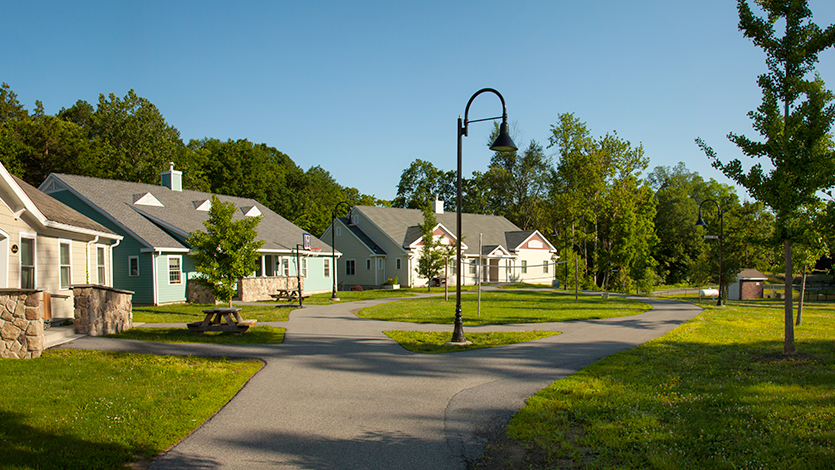Marist Partners with Anderson Center for Autism to Validate Tool to Measure Quality of Life for People with Autism

Initiative validates the San Martín and Kids Life Scales, which originated in Spain, to assess the quality of life for people with autism in the United States who present with severe communication challenges.
October 15, 2019—After four years of a collaborative research initiative, Anderson Center for Autism and Marist College announced today the publication of an article that validates the San Martín and Kids Life Scales as successful tools to measure the quality of life for adults and young people with autism when translated from the original Spanish version into English. The team that co-authored the study includes: Mary Stone, Ph.D. (Assistant Professor of Psychology, Marist College), Sudi Kash, Ph.D. (Chief Clinical Officer, Anderson Center for Autism), Teresa Butler, BA (Data Manager, Anderson Center for Autism), Karolina Callahan, BA (Research Assistant, Marist College), Miguel Ángel Verdugo, Ph.D. (INICO Research Center, director; University of Salamanca, Spain), and Laura E. Gómez, Ph.D. (INICO Research Center, University of Oviedo, Spain). The original research of this tool, conducted in Spain, was authored by Verdugo and Gómez.
Said Dr. Kash, “Our goal was to come up with a tool that could help us understand how those who cannot communicate for themselves are experiencing life, ultimately supporting our mission at Anderson Center of optimizing the quality of life for people with autism. We went on a global search for tools that were not just medically-focused, but looked at all aspects of life. We discovered that similar work had been done in Spain, and decided to work with Marist to research the tools for use in this country. We shared a vision with them; it worked beautifully. And the original authors in Spain were very generous, always making themselves available as we went through the four-year research project. We discovered that the San Martín Scale can indeed quantify quality of life for people with severe autism who cannot otherwise articulate their experiences. This has the potential to make a far-reaching impact on the way Anderson Center for Autism and other organizations throughout the country approach caring for and educating people with autism.”
According to the Centers for Disease Control, 1 in 59 are now diagnosed with autism, which presents with communication, sensory processing, and behavioral challenges. Anderson, which has been in existence for nearly a century, provides educational, vocational, and residential services to individuals with autism.
Located approximately 10 miles north of Marist College, Anderson has worked with the school on many levels over the years in addition to this joint research project.
Said Dr. Deborah Gatins, Dean of the School of Social and Behavioral Sciences and Associate Professor of Psychology at Marist, “The School of Social and Behavioral Sciences has had a longstanding and positive relationship with Anderson Center for Autism. Psychology majors have completed internships at Anderson where they hone their clinical skills for working with people with autism. Teacher education students may choose to intern in Anderson's classrooms or even to immerse themselves there as student-teachers. Marist and Anderson have also collaborated on research projects, such as this recent work done under the guidance of Dr. Mary Stone; she and her student team helped to validate a survey used to assess the quality of life of Andersen residents, as well as provided general guidance with regard to how to use data to inform program practices.”

Dr. Mary Stone, Assistant Professor of Psychology at Marist College
Added Dr. Stone, “Collaborating with Dr. Kash and her team at Anderson was an extremely gratifying experience. Team members from Anderson and Marist were equal partners and shared the responsibility of shaping the project to ensure mutual benefit. Four undergraduate student researchers from Marist gained invaluable experience by conducting high-quality research. Two of these students, Karolina Callahan ’19 and Emmanuelle Farrel ’20, presented their work at the 2018 meeting of the North Eastern Psychological Association and the 2019 meeting of the Eastern Psychological Association (where the work was honored with a regional research award by the Psi Chi International Psychology Honors Society). In addition to improving the lives of their residents, clinical and administrative staff from Anderson Center can now share the expertise they have developed through this collaboration with similar agencies looking for valid and reliable tools to measure the quality of life of individuals severely to profoundly impacted by autism.
For those with communication challenges like the students and residents at Anderson, Dr. Kash explained that measuring quality of life has been a longtime challenge, which can be overcome by implementing the San Martín and Kids Life Scales.
Said Kash, “For families, it means so much to be able to assess how their loved ones with autism are really doing. It’s a tool of inclusion. All of the things that are important to everyone’s quality of life are important to people on the spectrum. We’re all human beings. Regardless of disabilities, our essential needs are similar and every person deserves the opportunity to have those areas that aren’t working addressed.”
Said Patrick Paul, CEO and Executive Director at Anderson Center for Autism, “We’re thrilled to have been able to work with Marist on this research; their team is always ready to embrace new opportunities to collaborate, and this project is so aligned with our mission. It’s also, of course, incredibly gratifying to think that we can now provide families with the feedback needed about the way their loved ones are experiencing life - what’s working and what needs to be addressed—which will hopefully offer peace of mind.”
For the article abstract and overview, visit https://www.readcube.com/articles/10.1007/s10882-019-09686-0.
About Anderson Center for Autism
Our mission at Anderson Center for Autism is to optimize the quality of life for people with autism.



